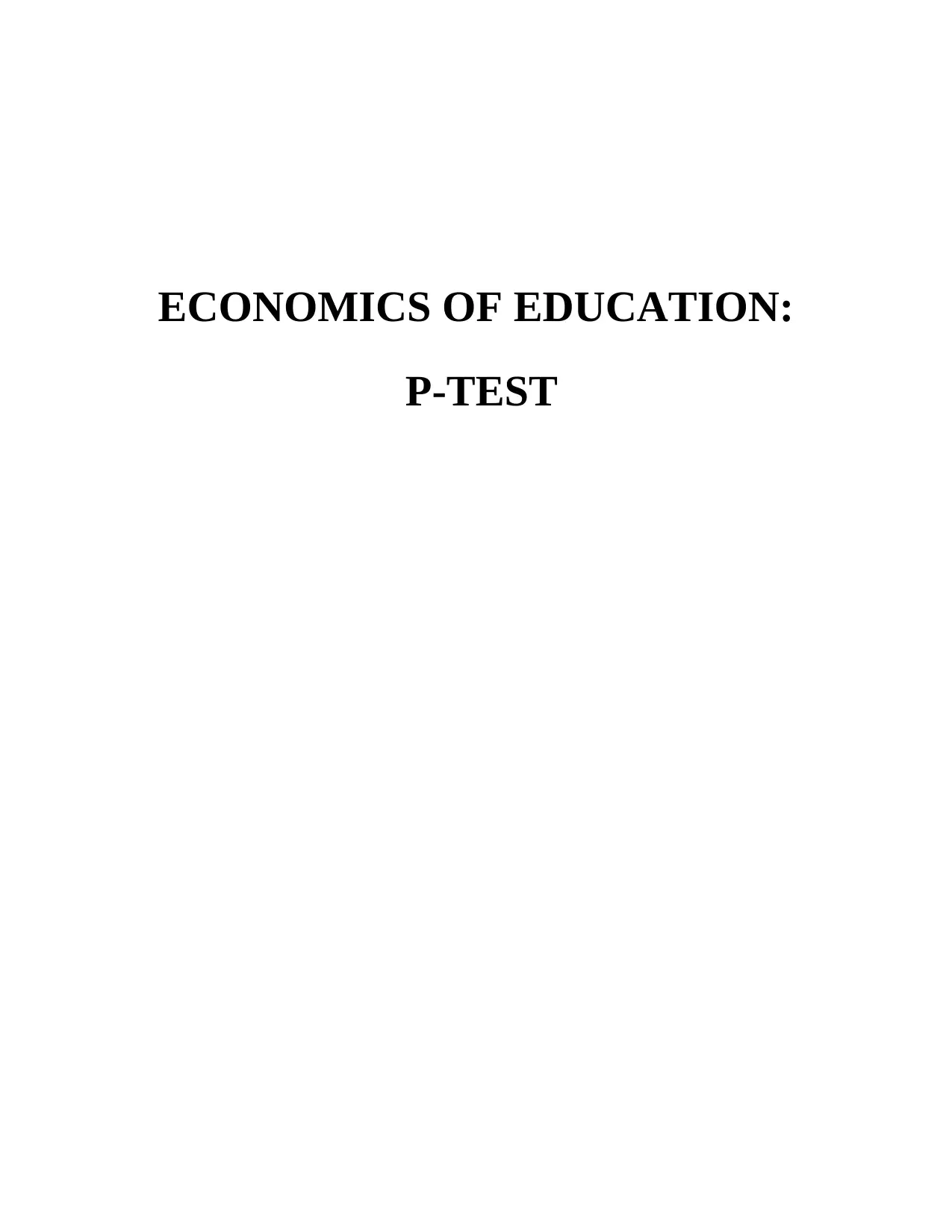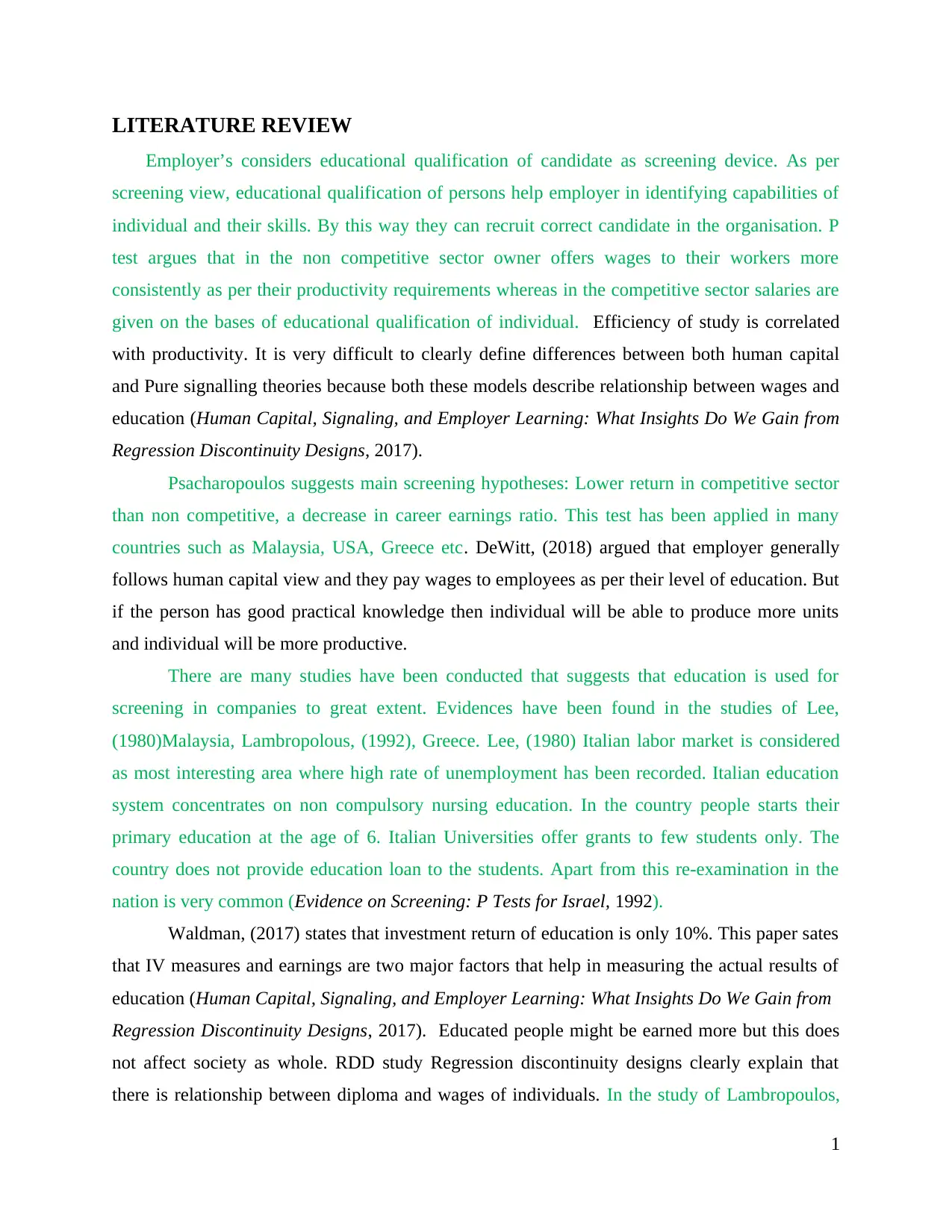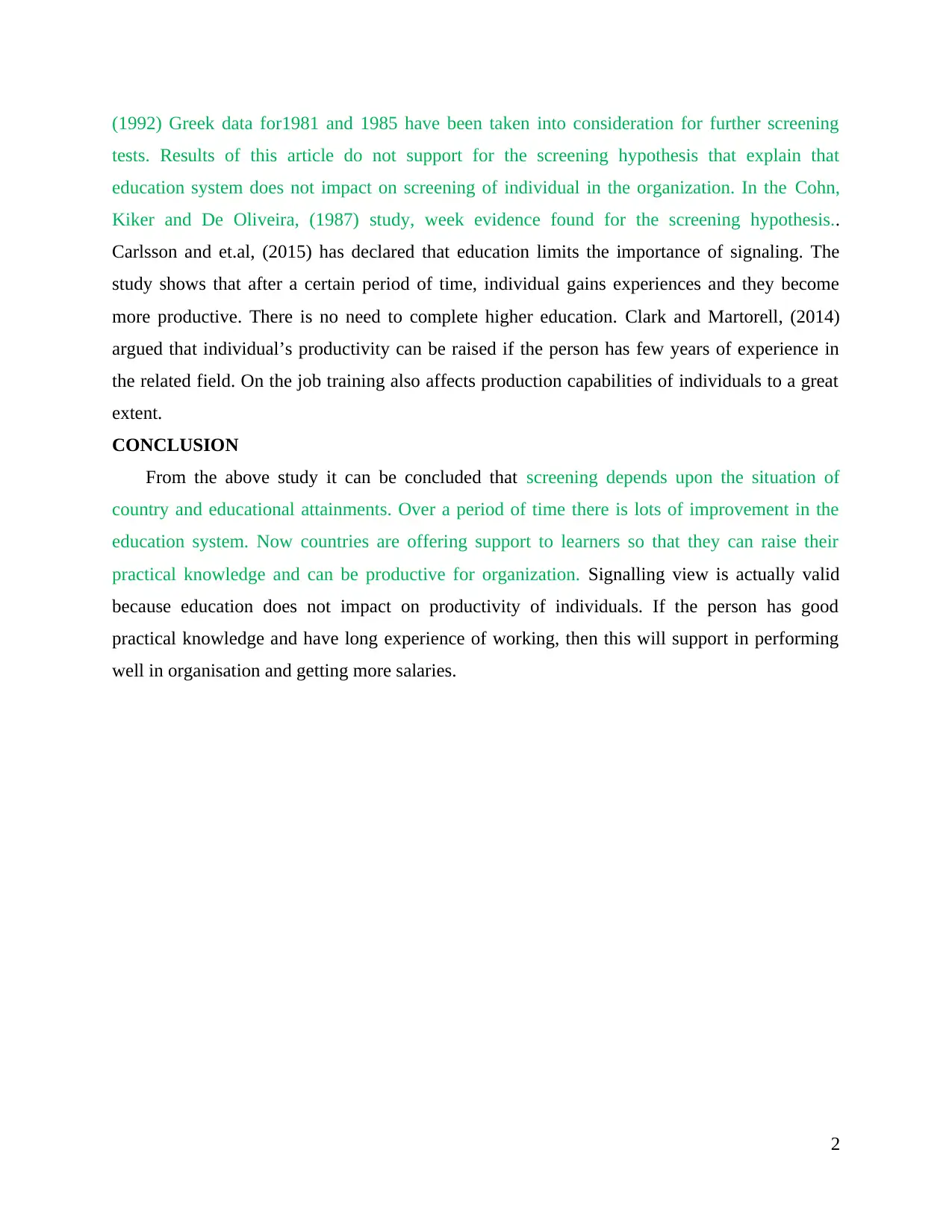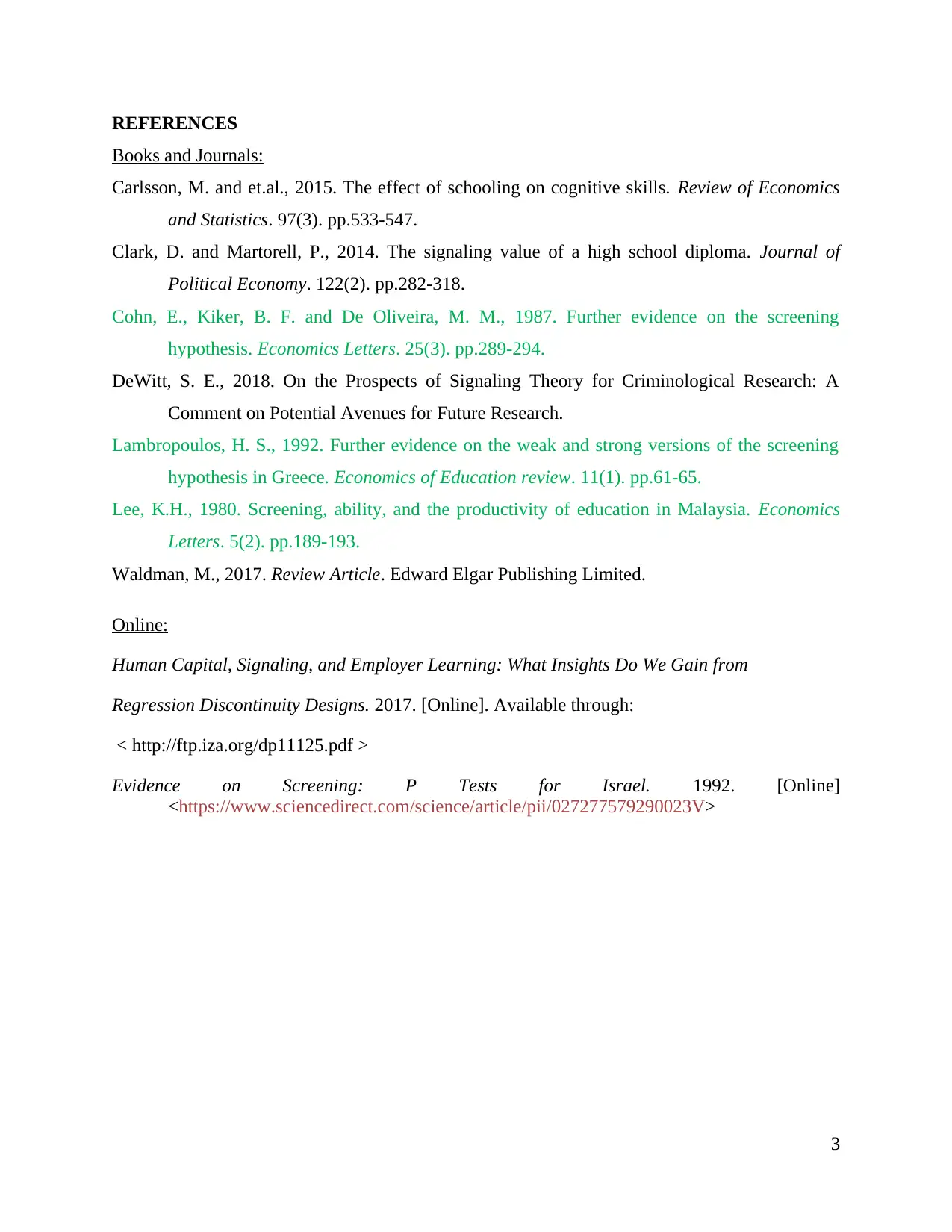Analysis of P-Test in Economics of Education: Literature Review
VerifiedAdded on 2020/11/23
|5
|990
|386
Report
AI Summary
This report provides a comprehensive literature review on the economics of education, specifically focusing on the P-Test. It explores the screening hypothesis, human capital theory, and signaling theory, examining how employers use educational qualifications to assess candidates. The review analyzes various studies conducted in countries like Malaysia, the USA, and Greece, discussing the impact of education on wages and productivity. It delves into the debate between human capital and signaling theories, and the role of experience and on-the-job training. The report concludes that screening depends on the country's situation and educational attainments, and that practical knowledge and experience are crucial for success in the workplace, supporting the signaling view that education does not directly impact productivity. The report references several books and journals to support its arguments.

ECONOMICS OF EDUCATION:
P-TEST
P-TEST
Secure Best Marks with AI Grader
Need help grading? Try our AI Grader for instant feedback on your assignments.

TABLE OF CONTENTS
LITERATURE REVIEW................................................................................................................1
CONCLUSION................................................................................................................................2
REFERENCES................................................................................................................................3
LITERATURE REVIEW................................................................................................................1
CONCLUSION................................................................................................................................2
REFERENCES................................................................................................................................3

LITERATURE REVIEW
Employer’s considers educational qualification of candidate as screening device. As per
screening view, educational qualification of persons help employer in identifying capabilities of
individual and their skills. By this way they can recruit correct candidate in the organisation. P
test argues that in the non competitive sector owner offers wages to their workers more
consistently as per their productivity requirements whereas in the competitive sector salaries are
given on the bases of educational qualification of individual. Efficiency of study is correlated
with productivity. It is very difficult to clearly define differences between both human capital
and Pure signalling theories because both these models describe relationship between wages and
education (Human Capital, Signaling, and Employer Learning: What Insights Do We Gain from
Regression Discontinuity Designs, 2017).
Psacharopoulos suggests main screening hypotheses: Lower return in competitive sector
than non competitive, a decrease in career earnings ratio. This test has been applied in many
countries such as Malaysia, USA, Greece etc. DeWitt, (2018) argued that employer generally
follows human capital view and they pay wages to employees as per their level of education. But
if the person has good practical knowledge then individual will be able to produce more units
and individual will be more productive.
There are many studies have been conducted that suggests that education is used for
screening in companies to great extent. Evidences have been found in the studies of Lee,
(1980)Malaysia, Lambropolous, (1992), Greece. Lee, (1980) Italian labor market is considered
as most interesting area where high rate of unemployment has been recorded. Italian education
system concentrates on non compulsory nursing education. In the country people starts their
primary education at the age of 6. Italian Universities offer grants to few students only. The
country does not provide education loan to the students. Apart from this re-examination in the
nation is very common (Evidence on Screening: P Tests for Israel, 1992).
Waldman, (2017) states that investment return of education is only 10%. This paper sates
that IV measures and earnings are two major factors that help in measuring the actual results of
education (Human Capital, Signaling, and Employer Learning: What Insights Do We Gain from
Regression Discontinuity Designs, 2017). Educated people might be earned more but this does
not affect society as whole. RDD study Regression discontinuity designs clearly explain that
there is relationship between diploma and wages of individuals. In the study of Lambropoulos,
1
Employer’s considers educational qualification of candidate as screening device. As per
screening view, educational qualification of persons help employer in identifying capabilities of
individual and their skills. By this way they can recruit correct candidate in the organisation. P
test argues that in the non competitive sector owner offers wages to their workers more
consistently as per their productivity requirements whereas in the competitive sector salaries are
given on the bases of educational qualification of individual. Efficiency of study is correlated
with productivity. It is very difficult to clearly define differences between both human capital
and Pure signalling theories because both these models describe relationship between wages and
education (Human Capital, Signaling, and Employer Learning: What Insights Do We Gain from
Regression Discontinuity Designs, 2017).
Psacharopoulos suggests main screening hypotheses: Lower return in competitive sector
than non competitive, a decrease in career earnings ratio. This test has been applied in many
countries such as Malaysia, USA, Greece etc. DeWitt, (2018) argued that employer generally
follows human capital view and they pay wages to employees as per their level of education. But
if the person has good practical knowledge then individual will be able to produce more units
and individual will be more productive.
There are many studies have been conducted that suggests that education is used for
screening in companies to great extent. Evidences have been found in the studies of Lee,
(1980)Malaysia, Lambropolous, (1992), Greece. Lee, (1980) Italian labor market is considered
as most interesting area where high rate of unemployment has been recorded. Italian education
system concentrates on non compulsory nursing education. In the country people starts their
primary education at the age of 6. Italian Universities offer grants to few students only. The
country does not provide education loan to the students. Apart from this re-examination in the
nation is very common (Evidence on Screening: P Tests for Israel, 1992).
Waldman, (2017) states that investment return of education is only 10%. This paper sates
that IV measures and earnings are two major factors that help in measuring the actual results of
education (Human Capital, Signaling, and Employer Learning: What Insights Do We Gain from
Regression Discontinuity Designs, 2017). Educated people might be earned more but this does
not affect society as whole. RDD study Regression discontinuity designs clearly explain that
there is relationship between diploma and wages of individuals. In the study of Lambropoulos,
1

(1992) Greek data for1981 and 1985 have been taken into consideration for further screening
tests. Results of this article do not support for the screening hypothesis that explain that
education system does not impact on screening of individual in the organization. In the Cohn,
Kiker and De Oliveira, (1987) study, week evidence found for the screening hypothesis..
Carlsson and et.al, (2015) has declared that education limits the importance of signaling. The
study shows that after a certain period of time, individual gains experiences and they become
more productive. There is no need to complete higher education. Clark and Martorell, (2014)
argued that individual’s productivity can be raised if the person has few years of experience in
the related field. On the job training also affects production capabilities of individuals to a great
extent.
CONCLUSION
From the above study it can be concluded that screening depends upon the situation of
country and educational attainments. Over a period of time there is lots of improvement in the
education system. Now countries are offering support to learners so that they can raise their
practical knowledge and can be productive for organization. Signalling view is actually valid
because education does not impact on productivity of individuals. If the person has good
practical knowledge and have long experience of working, then this will support in performing
well in organisation and getting more salaries.
2
tests. Results of this article do not support for the screening hypothesis that explain that
education system does not impact on screening of individual in the organization. In the Cohn,
Kiker and De Oliveira, (1987) study, week evidence found for the screening hypothesis..
Carlsson and et.al, (2015) has declared that education limits the importance of signaling. The
study shows that after a certain period of time, individual gains experiences and they become
more productive. There is no need to complete higher education. Clark and Martorell, (2014)
argued that individual’s productivity can be raised if the person has few years of experience in
the related field. On the job training also affects production capabilities of individuals to a great
extent.
CONCLUSION
From the above study it can be concluded that screening depends upon the situation of
country and educational attainments. Over a period of time there is lots of improvement in the
education system. Now countries are offering support to learners so that they can raise their
practical knowledge and can be productive for organization. Signalling view is actually valid
because education does not impact on productivity of individuals. If the person has good
practical knowledge and have long experience of working, then this will support in performing
well in organisation and getting more salaries.
2
Secure Best Marks with AI Grader
Need help grading? Try our AI Grader for instant feedback on your assignments.

REFERENCES
Books and Journals:
Carlsson, M. and et.al., 2015. The effect of schooling on cognitive skills. Review of Economics
and Statistics. 97(3). pp.533-547.
Clark, D. and Martorell, P., 2014. The signaling value of a high school diploma. Journal of
Political Economy. 122(2). pp.282-318.
Cohn, E., Kiker, B. F. and De Oliveira, M. M., 1987. Further evidence on the screening
hypothesis. Economics Letters. 25(3). pp.289-294.
DeWitt, S. E., 2018. On the Prospects of Signaling Theory for Criminological Research: A
Comment on Potential Avenues for Future Research.
Lambropoulos, H. S., 1992. Further evidence on the weak and strong versions of the screening
hypothesis in Greece. Economics of Education review. 11(1). pp.61-65.
Lee, K.H., 1980. Screening, ability, and the productivity of education in Malaysia. Economics
Letters. 5(2). pp.189-193.
Waldman, M., 2017. Review Article. Edward Elgar Publishing Limited.
Online:
Human Capital, Signaling, and Employer Learning: What Insights Do We Gain from
Regression Discontinuity Designs. 2017. [Online]. Available through:
< http://ftp.iza.org/dp11125.pdf >
Evidence on Screening: P Tests for Israel. 1992. [Online]
<https://www.sciencedirect.com/science/article/pii/027277579290023V>
3
Books and Journals:
Carlsson, M. and et.al., 2015. The effect of schooling on cognitive skills. Review of Economics
and Statistics. 97(3). pp.533-547.
Clark, D. and Martorell, P., 2014. The signaling value of a high school diploma. Journal of
Political Economy. 122(2). pp.282-318.
Cohn, E., Kiker, B. F. and De Oliveira, M. M., 1987. Further evidence on the screening
hypothesis. Economics Letters. 25(3). pp.289-294.
DeWitt, S. E., 2018. On the Prospects of Signaling Theory for Criminological Research: A
Comment on Potential Avenues for Future Research.
Lambropoulos, H. S., 1992. Further evidence on the weak and strong versions of the screening
hypothesis in Greece. Economics of Education review. 11(1). pp.61-65.
Lee, K.H., 1980. Screening, ability, and the productivity of education in Malaysia. Economics
Letters. 5(2). pp.189-193.
Waldman, M., 2017. Review Article. Edward Elgar Publishing Limited.
Online:
Human Capital, Signaling, and Employer Learning: What Insights Do We Gain from
Regression Discontinuity Designs. 2017. [Online]. Available through:
< http://ftp.iza.org/dp11125.pdf >
Evidence on Screening: P Tests for Israel. 1992. [Online]
<https://www.sciencedirect.com/science/article/pii/027277579290023V>
3
1 out of 5
Your All-in-One AI-Powered Toolkit for Academic Success.
+13062052269
info@desklib.com
Available 24*7 on WhatsApp / Email
![[object Object]](/_next/static/media/star-bottom.7253800d.svg)
Unlock your academic potential
© 2024 | Zucol Services PVT LTD | All rights reserved.